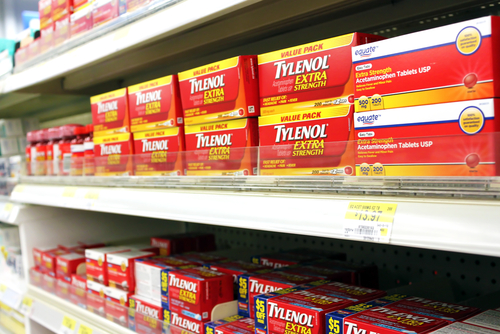If you have high blood pressure you most likely are aware that certain prescription medications can wreak havoc on your numbers and interfere with your hypertension treatment. But what many high blood pressure sufferers don’t realize is that numerous over-the-counter medicines that are completely safe for most people to take, can also have similar negative effects. Common medicines like cold remedies, cough syrups and allergy pills can pose a danger to those with high blood pressure, so you should always speak to your doctor before taking any medication, prescription or otherwise.
Here are 4 over-the-counter medications to avoid if you suffer from hypertension:
NSAIDS
Common Brand Names: Advil (ibuprofen), Mobic (meloxicam), Aleve (naproxen)
NSAIDS stands for non-steroidal anti-inflammatory drugs and are one of the most common over-the-counter medicines on the market today. Most people, at one time or another, have used these medicines for the relief of pain associated with back pain, headaches and muscle strain.
Although NSAIDS are considered a safe medicine and most healthy individuals can take them short term for pain management without any issues, NSAIDS have been found to cause certain long-term changes which can eventually alter your blood pressure. Essentially these drugs have the potential to cause your body to retain fluid and this retention can increase your blood pressure. Long-term use of NSAIDS has also been linked to diminished kidney function which can have consequences for ongoing blood pressure regulation.
Cold & Flu Remedies
Go into any drug store in the United States and you will see shelves lined with numerous cold and flu remedies that are developed to ease the downright nasty symptoms of colds and flues. It doesn’t matter which form these remedies come in: capsules, pills, powders, gels or syrups, each remedy contains the same few ingredients just in different formulations.
Decongestants are used to bring relief for those who are having trouble breathing and to clear nasal passages. They normally contain acetaminophen or ibuprofen to relieve sore and aching muscles. They may also contain some form of cough suppressant drug. All of these ingredients have the ability to cause both direct and indirect changes in your blood pressure. For instance, decongestants may cause blood vessels to tighten which can immediately raise blood pressure. Other ingredients may indirectly cause changes in how the body handles salt and water.
Tylenol (acetaminophen)
People take Tylenol for the same reasons they take Advil, to relieve their mild pain symptoms, but it’s important to note that acetaminophen works differently in the body than ibuprofen or naproxen. Like the NSAIDS, acetaminophen is generally safe, but it can have an effect on blood pressure in certain people and under certain circumstances.
When an individual uses too much acetaminophen over a short period of time, or uses it for too long, it can cause liver damage which can lead to what’s called portal hypertension. This is a condition where there is an increase in the blood pressure of the portal venous system. These are veins coming from the intestine, spleen, stomach and pancreas that merge into the portal vein which branches into smaller vessels traveling through the liver. If these vessels in the liver become damaged for any reason, blood cannot flow properly and high pressure in the portal system develops.
There have been studies suggesting that acetaminophen may increase the risk of developing high blood pressure in women even when taken in the appropriate amounts.
Decongestants
Decongestants are any medicine that is marketed as being able to open your nasal passages. Some decongestants have also been developed to slow down the production of mucus in the body. This mucus can clog upper respiratory passages and cause blood vessels in the nose to constrict. Most decongestants on the market contain one of the stimulants pseudoephredrine or phenylephrine which can increase blood pressure. In small amounts and for individuals who don’t duffer from high blood pressure, these stimulants are safe, but those with hypertension need to be extra cautious. There are decongestants formulated without the stimulants, but these can be harder to find in stores. Those with hypertension should speak with their doctor who can recommend the right ones and help you locate them.
As if having high blood pressure weren’t challenging and scary enough, having to constantly monitor what other medications you take, even seemingly safe ones, can feel overwhelming.
Wouldn’t it be great if you could get to the root cause of your high blood pressure and lower it using a simple and all-natural method? Wouldn’t it feel amazing to get your health and energy back?
On the following page one doctor will share some information with you that drug companies don’t want you to know about, and you’ll learn how one of her patients used her method to lower his blood pressure naturally and simply from 200 over 100 to 126 over 71 and all within one week.
Sound too good to be true?
Watch the video on the next page to learn this doctor’s method and get your blood pressure numbers down in as little as three days.
Image Source: Niloo / Shutterstock.com
 Validating...
Validating... 





Leave a Reply